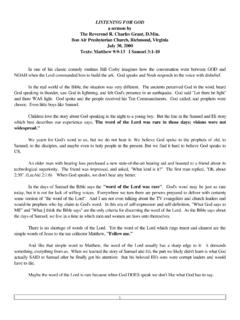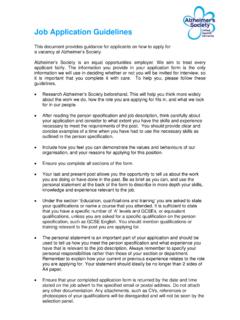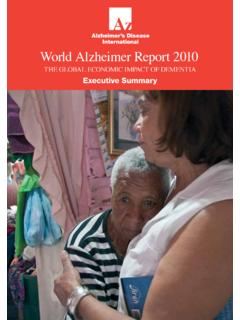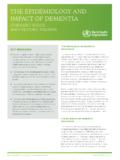Transcription of Facing Alzheimer’s and Dementia A sermon by R. Charles ...
1 1 Facing alzheimer s and DementiaA sermon byR. Charles Grant, Air Presbyterian Church, Richmond, VirginiaEaster 5 Mother s Day May 13, 2001 Text: II Corinthians 4:17-5:1We joke about Dementia because it is no laughing matter. Probably we are more anxious aboutlosing our minds than losing any feature of our physical health. How many times have you heard orsaid that any kind of physical impairment is more tolerable than the loss of your mental abilities? Andof all the bad news that your doctor could give you, what are the words most feared of all? alzheimer alzheimer s disease was first documented in the scientific literature nearly 100 yearsago, it really only entered our common vocabulary within the last fifteen years. And it was only afterPresident Reagan s poignant letter to the nation back in 1994 that alzheimer s entered the center stage inthe media and public policy have always known people, of course, who became more forgetful and easily confused in theiradvanced years.
2 But alzheimer s is different. It can afflict an otherwise healthy person of ANY age. Itbrings tragic, progressive, and mental and physical impairment. And it threatens the health and wealth ofthe whole family, what is alzheimer s disease? We use it in everyday conversation as a shorthand for any sortof Dementia , but alzheimer s is but one form of impairment of a person s ability to use his the progressive loss of mental capacities is a common symptom of the aging s, on the other hand, is a form of Dementia that is NOT merely a function of the normal agingprocess. But alzheimer s does occur more frequently among older persons, and as the older segment ofour society grows in numbers, so do the number of persons afflicted with alzheimer forms of Dementia bring the loss of mental capabilities.
3 As alzheimer s progresses it alsobrings physical impairments, too. Many in the medical community now identify alzheimer s as aterminal illness. alzheimer s may already be the 4th or 5th leading cause of is estimated that 50% of the Dementia cases among the elderly is a function of alzheimer 20: of dimentia cases are the result of strokes, with another 20% of Dementia cases being the resultof a combination of alzheimer s AND having suffered multiple strokes. At one time alzheimer s wasthought to be rare. Now we know that 5-7% of the population over 65 or over two million people haveAlzheimer s. The figure rises to 20% for those over the age of 80. alzheimer s reduces life expectancyby one third. Up to 58% of the residents of nursing homes suffer from alzheimer social and economic effects of all forms of Dementia , and especially alzheimer s, can bedevastating.
4 Most alzheimer s patients will need institutional care, but few families are financiallyprepared for such a burden. As actor David Hyde Pierce whose father has alzheimer s testifiedbefore Congress recently, alzheimer s threatens to bankrupt the s a little recap of what alzheimer s is. But as anyone who has lived with alzheimer s knows,there is so much more to alzheimer s than clinical diagnoses and statistical data. Ronald Reagan said hewas entering that long sunset at the end of life . Caregivers are more likely to speak of the 36 hourday , as one guide to living with alzheimer s describes it: the demands and the disappointments and2burdens of alzheimer s can be simply overwhelming. When one you love is an alzheimer s patient, yougrieve for his mental death, even as you continue to carry responsibilities for preserving his physical s like losing a parent or a husband or a wife twice separated by a lonely journey through the valley ofthe shadow of deathlike does our faith and the Bible have to say about Dementia and alzheimer s?
5 Nothing writers of the Bible viewed old age as a blessed time of life, and the aged as the wise ones of people lived into what we consider old age, but those who did were revered and honored. Theancients simply did not know much about a lot of what we live with on a daily our Biblical faith does have a lot to say to us who live with alzheimer s and other forms ofdementia. And the Bible has a lot to say to those who love and care for those afflicted by such us declare at the outset that from the perspective of faith, there is no stigma attached toAlzheimer s and other forms of Dementia . These are illnesses, not divine afflictions. There is noreason to hide the burden you carry as a person with alzheimer s, or as the caregiver OF someoneafflicted.
6 There is no shame to having these illnesses, just as there is no shame to having chickenpox orheart disease or cancer. Yes, they are terrifying illnesses, but the illnesses themselves are terror leads to a fundamental theological affirmation: no matter what illness befalls you including those which rob you of your mental capacities, YOU ARE AND REMAIN A CHILD OFGOD. As our confession puts it, In life and in death we belong to God. One does not cease to be achild of God, simply because he can no longer offer a verbal affirmation of faith. One is not excludedfrom God s care or God s kingdom by mental or physical impairment of any sort. That may seemobvious. But we live in a world which treasures youth and intelligence and physical beauty, and wereceive messages everyday that say in essence, if you are not youthful and bright and attractive, you arenot really a human being.
7 Nothing could be farther from God s truth! You ARE a child of God!Because we are ALL children of God, Our faith calls us to extend respectful care and dignityto those of our sisters and brothers with alzheimer s and other forms of Dementia . As Jesus says inthe great judgement scene of Matthew 25, the way we treat the least important members of society is theway we treat Christ. For it is only when we see the least of these as our brothers and sisters that we canrecognize them as fellow children of respectful dignity we are called to extend to those with forms of Dementia comes on at leasttwo levels: personal and societal: we are called to personally extend God s compassionate care to thosewith Dementia . We cannot shut them out of our lives, abandoning them to God s care alone.
8 God s carecomes through our hands and begin with our own personal, face to face care. But our care is not enough: as citizens and asa society, we need to support changes in public policy to insure that all of our citizens receive qualityhealth and custodial care. We must not rob any of our sisters and brothers of their God-given dignity!Our personal compassionate care has as a primary focus the caregiver: the careGIVER needs toRECEIVE our care. Our friends who are caring for a husband or wife or mother or father withAlzheimer s need us as much as their suffering loved ones need them. Maybe more so. The church s roleas the living body of Christ is to extend love and support and acceptance to the caregivers of alzheimer sand Dementia patients.
9 Our role is to care for the it is a two way street: caregivers, we want to help you. And we need you to let us help do not have to do it all alone! That is why we in the community of faith, in YOUR community offaith are here. We need each other. We can help each other. As the folk song puts it, We are one in theSpirit, we are one in the will walk with each other, we will walk side by side, and together wewill guard each one s dignity and save each one s pride, and they will know we are Christians, by ourlove, by our love. Our support and care for the caregiver extends to those last and sometimes most painfuldecisions when it is time to let go. Often there comes a time when a person s dignity is best preservedby letting one die in peace.
10 I do not think our faith obligates us to preserve the body at all costs throughheroic and artificial means. Our affirmation that in life and death we belong to God frees us to let leads to one last, but most important affirmation about human lives afflicted withAlzheimer s and other forms of Dementia : we need to remember that it is resurrection, and not eternalyouth or even eternal life that is the primary expression of Christian hope and faith. None of us willlive forever. We will all die. And if we live long enough, we will experience some form of Dementia andmany of us will experience profound Dementia . Many of us will be alzheimer s patients. We will all by the mighty and powerful grace of God, we shall be risen and restored in Christ!







![INDEX [www.circa.org.im]](/cache/preview/6/b/6/3/4/6/b/5/thumb-6b6346b51bd892fd2cf4acc39be9c895.jpg)


